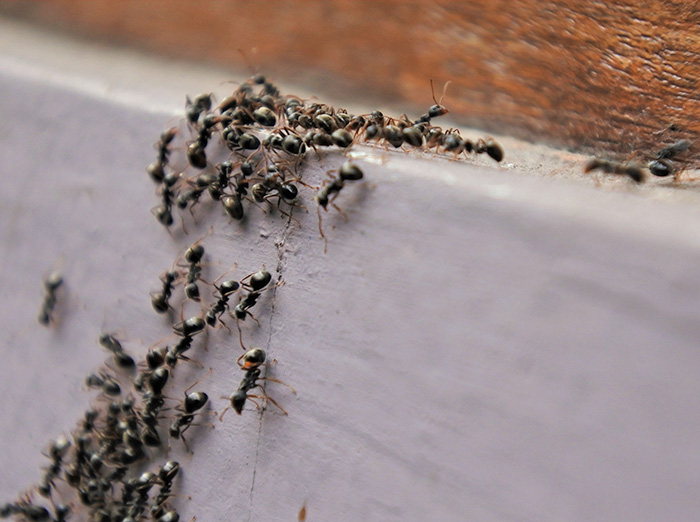Are Wasps Dangerous?
Every summer the pest control specialists at EnviroPest receive a lot of questions about which stinging insects are active in Colorado, how to tell them apart, and of course, which ones are dangerous. This is particularly true when the discussion turns to wasps. As you read on, we hope you’ll find this blog helpful in identifying wasps and understanding the risks they pose to residents of Denver, Colorado Springs, and throughout the Rocky Mountain state.

Social wasps vs solitary wasps in Colorado
Whether it’s common knowledge or not really depends upon the interest level of the individual but here in Colorado wasps are divided into two distinctively different groups, solitary and social. You can probably guess by their names the differences but please humor us as we make the distinction between the two.
What are social wasps?
Similar to ants and termites, social wasps live in communal nests with hundreds, if not thousands, of members. Within each nest, there are distinct castes or groups that have specific roles or functions that are designed to keep the colony alive and thriving. Here in Colorado, yellow jackets, baldfaced hornets, and paper wasps are three of the most common social wasps encountered.
Where social wasps nest
Social wasp nests can be found underground (yellow jackets), in trees and shrubs (baldfaced hornets), under eaves and on the sides of buildings (aerial yellow jackets), under sheltered areas like the eaves of a building or branches of a tree (paper wasps) or in the ends of open metal pipes or any hole in exposed metal (European paper wasp).
What are solitary wasps?
Solitary wasps, as their name suggests, are types of wasps that do not exist in community with other wasps. Instead, females build nests for their individual use and are responsible for providing food as well. They do not utilize a caste system and therefore do not have workers to assist in building and feeding. Solitary wasps include mud daubers, cicada killers, and velvet ants (yes, they’re wasps).
Where solitary wasps nest
The nesting habits of solitary wasps in Colorado vary by type. Some burrow underground, while others nest inside rotten wood and cavities or build nests out of mud.
Are wasps in Colorado dangerous?
When it comes to wasps in Colorado, we certainly encourage property owners to be wary of encountering these stinging insects. Though solitary wasps are capable of stinging, they are not easily provoked. Social wasps, on the other hand, are the wasps to pay extra close attention to and to avoid whenever possible. Yellow jackets and paper wasps are the two that Coloradoans are stung by the most and unfortunately, they can sting multiple times. What’s more, they aren’t nearly as docile as solitary wasps and are likely to be the aggressors at the least provocation.
Wasp stings and what to expect
During the summer months, wasp stings are quite common and really, the more time you spend outside enjoying the warm weather, the greater your chances of being sting by a wasp are. For the majority of wasp sting victims, the sting produces sharp pain or burning, redness, and possibly swelling or itching.
Unfortunately, not everyone is lucky to avoid complications from a wasp sting. Individuals who have what experts call a “large local reaction” to a wasp sting might experience more severe symptoms and or have an allergic reaction.
Anaphylaxis, the most severe allergic reaction to a wasp sting, is when a person’s body goes into shock in response to the venom injected by the wasp(s). Signs of anaphylaxis shock should never be ignored and include, but are not limited to:
- Severe swelling of the face, lips, or throat
- Breathing troubles
- Dizziness and/or lightheadedness
- A sudden drop in blood pressure
- Weak or racing pulse
- Diarrhea
- Nausea or vomiting
If you find yourself the recipient of a wasp sting and experience any of the symptoms mentioned above (or start having other health issues), contact your doctor immediately or call 911.
Despite the threat wasps pose, we need them
The relationship between us and wasps is delicate. As pollinators, they play a crucial role in our environment and we need them assisting honey bees. What we don’t need or want is to find them in or around our homes stinging our family members or causing damage to structures.
What to do if you find a wasp nest on your property
If you find a wasp nest too close to your home for your comfort or if you can’t enjoy your backyard because wasps are being a bit too aggressive, contact EnviroPest. Offering effective pest control services in the Denver metro, Colorado Springs, and Loveland as well as throughout Northern Colorado, our team of highly trained pest control specialists have the tools and knowledge to address your wasp problem quickly and effectively!
This blog was originally published 06/30/16. It has been updated to reflect the most up-to-date information about wasps in Colorado.

Testimonials
GETTING STARTED IS AS EASY AS 1-2-3
REQUEST FREE ESTIMATE
Pest Solutions For Homes & Businesses
We understand that pest problems can be unsettling and frustrating, but the solution shouldn't be. For over 55 years, we've been helping folks right here in Colorado take care of ants, spiders, mice, mosquitoes, wasps, bed bugs, bats and most other creepy crawly things. We'll get there fast to solve the issue quickly and affordably - Guaranteed.



